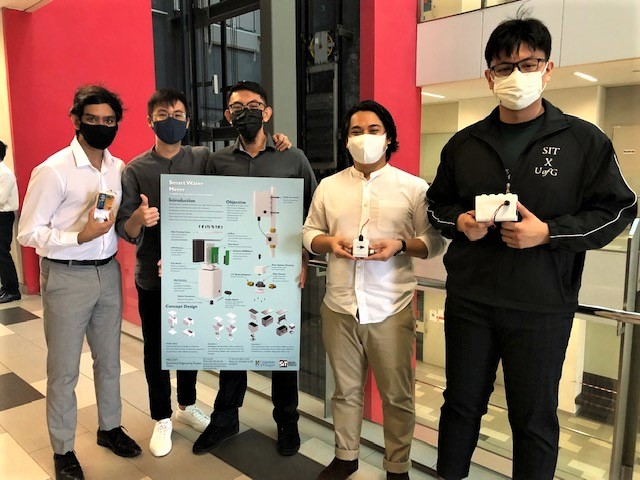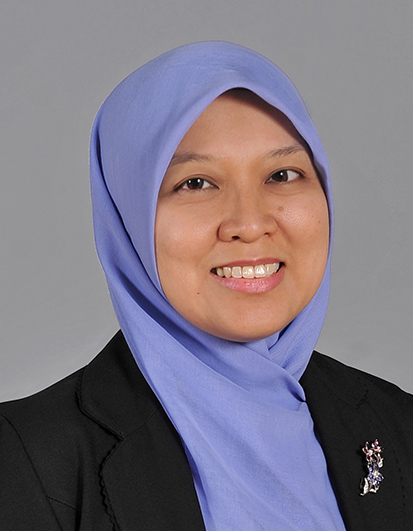SIT’s holistic approach to education readies next generation of employees

In collaboration with Ecosoftt and advised by their SIT Engineering and Design professors, SIT students created a smart water meter to help lower-income families track and optimise their water usage. Student Pradeep (far left) and his teammates from the SIT-University of Glasgow Mechanical Engineering programme, (from left) Shaun Yong Yu Zhe, Muhammad Hilmi bin Hut, Muhammad Zulhusni bin Jumat, Koh Liang Jie.
With the COVID-19 pandemic irrevocably changing the world of work, university graduates are entering an increasingly competitive job market that requires them to have more than just technical skills.
Employers are looking for well-rounded individuals with a holistic education who can comprehend and solve complex problems that transcend disciplines, said Dr Intan Azura Mokhtar, Associate Professor and Deputy Director, Community Leadership and Social Innovation Centre (CLASIC), Singapore Institute of Technology (SIT).
She was speaking at the recently concluded Applied Learning Conference 2022, organised by SIT to discuss and share best practices in academia-industry collaboration in applied learning and talent development.
“The skills which employers rate as most important today include the ability to communicate clearly, both in writing and orally; teamwork; ethical decision making; critical thinking; and the ability to apply knowledge in complex, multi-dimensional, and multi-disciplinary settings,” Dr Intan added.

“The skills which employers rate as most important today include the ability to communicate clearly, both in writing and orally; teamwork; ethical decision making; critical thinking; and the ability to apply knowledge in complex, multi-dimensional, and multi-disciplinary settings.” – Dr Intan Azura Mokhtar.
To provide a holistic education for students that will allow them to gain these skills, and to incorporate the Singapore Perspectives Framework in their curriculum, SIT is integrating Social Context (SC) elements in their undergraduate degree programmes and introducing the Social Innovation (SI) Project module.
From academic year 2022, all autonomous universities in Singapore are required to incorporate the Singapore Perspectives Framework in their curriculum. The framework is meant to support the universities as they build on existing efforts to deepen students’ understanding and appreciation of their role as citizens in Singapore, and Singapore’s place in the world.
Explaining the integration of SC elements in SIT degree programmes as a curriculum requirement, Dr Intan explained, “The awareness and understanding of domestic legislation, policies, and social compact tend to be glossed over in the eagerness to focus on technical specialisations and subject-specific competencies in the modules taught.”
“However, we cannot underestimate the extensive and far-reaching impact of legislation, policies, and social issues in Singapore on our profession, despite our deep and extensive technical specialisations and subject-specific competencies. In SIT, we are increasingly enhancing the contents and learning outcomes to incorporate greater awareness and applied learning of social issues in our degree programmes.”
For the SI Project module, students are provided with the opportunities to cross-fertilise ideas and work in inter-disciplinary teams on projects that focus on social diversity and inclusivity, changing demographics, environmental concerns, and sustainable practices.
One recent project saw SIT students working in collaboration with Ecosoftt and the Singapore Plumbing Society, to design and install smart water meters for low-income households in Singapore. The team also engaged with household members to understand their water consumption patterns and habits.
Dr Intan added, “In this module, students will apply the principles and mindset of being socially attuned and human-centred to understand the interdisciplinary and diverse factors, concerns, needs, and expectations that different stakeholders in society have, when addressing these issues and challenges.
“These projects are designed to prepare students for the inter-disciplinary nature of work teams and demands of stakeholders, regardless of the industry they venture into after graduation.”
Click here for more information on how SIT is integrating both SC and SI elements into its undergraduate degree programmes.



